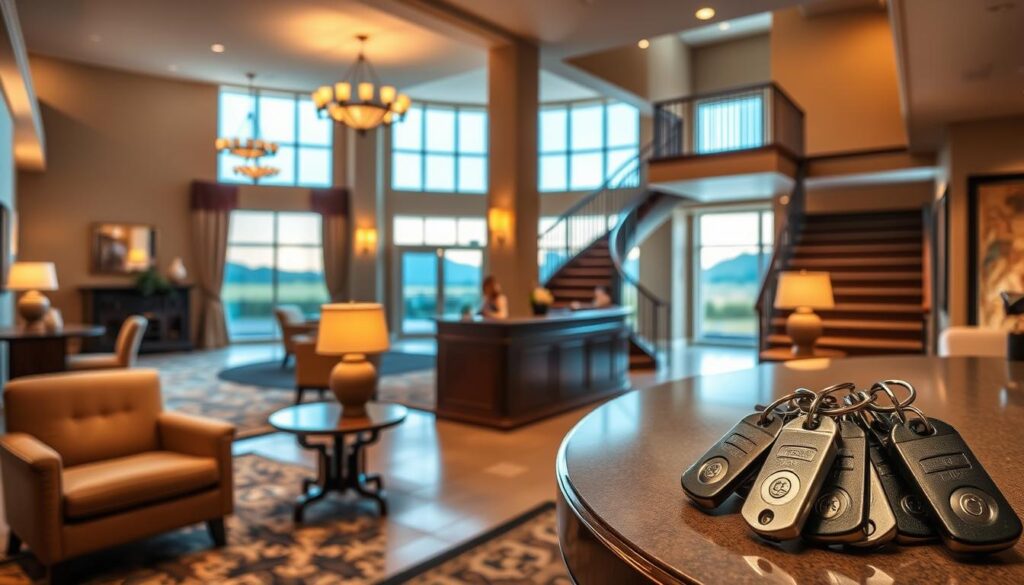Planning a trip can be a daunting task, but selecting the right hotel is crucial to making your travel experience unforgettable. With numerous accommodation options available, it’s essential to understand your travel needs and preferences.
Effective travel planning involves considering various factors, including location, amenities, and budget. By weighing these factors, you can make an informed decision that suits your needs and enhances your overall travel experience.
Key Takeaways
- Understand your travel needs and preferences
- Consider location, amenities, and budget when selecting a hotel
- Research and compare different accommodation options
- Look for hotels that offer the best value for your money
- Read reviews and check the hotel’s reputation before making a decision
Understanding Your Travel Needs and Preferences
To choose the ideal hotel, you first need to identify your travel preferences and requirements. Understanding your travel needs is crucial in narrowing down your options and finding a hotel that meets your expectations.
Identifying Your Travel Purpose
Your travel purpose significantly influences the type of accommodation you need. Are you traveling for business or leisure? This distinction is crucial as it determines the amenities and services you require.
Business vs. Leisure Requirements
Business travelers often need amenities like high-speed internet, meeting rooms, and possibly a business center. On the other hand, leisure travelers might prioritize amenities such as a spa, pool, or proximity to local attractions.
Solo, Couple, or Family Considerations
Whether you’re traveling alone, with a partner, or with family also affects your hotel preferences. For instance, families might need larger rooms or suites, while solo travelers might be more budget-conscious.
Determining Your Must-Have Amenities
Identifying the amenities that are must-haves for you is a critical step. Common considerations include Wi-Fi, parking, fitness center, and in-room amenities like a mini-bar or coffee maker.
| Amenity | Importance Level | Notes |
|---|---|---|
| Wi-Fi | High | Essential for staying connected |
| Fitness Center | Medium | Nice to have for maintaining routine |
| Parking | High | Crucial if you plan to rent a car |
Setting Your Comfort Level Expectations
Your comfort level expectations play a significant role in choosing the right hotel. Consider the level of luxury, cleanliness, and services that are important to you.
“The right hotel can make or break your trip. It’s not just about a place to stay; it’s about an experience that complements your travel plans.”
By understanding your travel needs and preferences, you can make an informed decision when selecting a hotel. This not only enhances your travel experience but also ensures that you get the best value for your money.

Establishing a Realistic Budget
Before booking a hotel, it’s essential to establish a budget that covers all your accommodation needs and expenses. This helps in narrowing down options and making a more informed decision.
Calculating Your Total Accommodation Costs
To calculate your total accommodation costs, start by looking at the base rate of the hotel. Then, consider any additional expenses such as taxes and fees. It’s crucial to factor in all potential costs to avoid surprises when checking out.
Hidden Fees to Watch For
Hotels often come with hidden fees that can significantly increase your bill. Be aware of these extra charges to stay within your budget.
Resort Fees and Surcharges
Resort fees and surcharges are common additional costs. These fees can cover amenities like pool maintenance, gym access, and Wi-Fi. Always check if these services are included in the initial price or charged separately.
Parking and Wi-Fi Costs
Parking and Wi-Fi are essential services that may incur additional costs. Some hotels charge exorbitant rates for parking and internet access, so it’s vital to factor these into your overall budget.
Value vs. Price Considerations
When choosing a hotel, consider the value you’re getting for your money, not just the price. Think about the services and amenities included and whether they align with your needs. Sometimes, paying a bit more for a hotel that offers comprehensive services can be more cost-effective in the long run.

Researching the Best Location
Researching the best location for your hotel is a critical step in planning a successful trip. The right location can enhance your travel experience, making it more enjoyable and stress-free.
Proximity to Attractions and Activities
One of the key factors to consider is the proximity to attractions and activities you plan to enjoy during your trip. Being close to your desired destinations can save time and energy, allowing you to make the most of your travel.
Transportation Options and Accessibility
Another crucial aspect is the availability of transportation options and accessibility of the area. Ensure that your hotel is well-connected to public transport or is within walking distance to key attractions.
Neighborhood Safety and Atmosphere
The neighborhood safety and atmosphere are also vital considerations. Research the local crime statistics and reviews from other travelers to get a sense of the area’s safety and ambiance.
Using Google Maps to Scout the Area
Utilize tools like Google Maps to scout the area around your potential hotel. This can give you a visual understanding of the location and its surroundings.
Checking Crime Statistics and Reviews
Additionally, check crime statistics and read reviews from other travelers to get a well-rounded understanding of the location’s safety and overall atmosphere.

By carefully researching these factors, you can choose a hotel location that meets your needs and enhances your overall travel experience.
Exploring Different Types of Accommodations
The world of accommodations is diverse, offering a range of options to suit different needs. When it comes to choosing where to stay, travelers are faced with a multitude of choices, each with its unique benefits and characteristics.
Traditional Hotels vs. Boutique Properties
Traditional hotels provide a familiar experience, often with a wide range of amenities and services. In contrast, boutique properties offer a more personalized touch, typically with unique decor and a focus on customer service. The choice between these two often depends on the traveler’s priorities, whether it’s the predictability of a traditional hotel or the charm of a boutique property.
Vacation Rentals and Airbnb Options
Vacation rentals and Airbnb options give travelers the feel of home, often with more space and the ability to self-cater. These options are particularly popular for longer stays or for families and groups. They offer a different experience from traditional hotels, with more flexibility and a local, homely atmosphere.

All-Inclusive Resorts and Their Benefits
All-inclusive resorts can be a cost-effective choice for longer stays, bundling accommodation, meals, and activities into one price. This can simplify budgeting and enhance the overall vacation experience by reducing the need to constantly pay for extras.
When All-Inclusive Makes Financial Sense
All-inclusive resorts make financial sense when the bundled price is less than the total cost of paying for each component separately. It’s also beneficial for those who prefer to have their expenses covered upfront, avoiding the surprise of additional costs at the end of their stay.
How to Choose the Perfect Hotel for Your Next Trip
With numerous hotels to choose from, creating a comparison checklist is essential for finding the perfect accommodation. This systematic approach helps you stay organized and focused on your needs.
Creating a Hotel Comparison Checklist
To start, identify the essential features that matter most to you. These may include price, location, amenities, and service quality.
Essential Features to Compare
- Price and value for money
- Proximity to local attractions and public transport
- Amenities such as Wi-Fi, fitness center, and restaurant options
- Cleanliness and overall condition of the hotel
Deal-Breakers vs. Preferences
Distinguish between your deal-breakers and preferences. For instance, a hotel with a great location might be a preference, while a hotel without a fitness center might not be a deal-breaker if you don’t plan to use it.
Weighing Pros and Cons of Each Option
Create a table to compare your top hotel choices:
| Hotel Name | Price | Location | Amenities |
|---|---|---|---|
| Hotel A | $100/night | Central | Pool, Gym, Free Wi-Fi |
| Hotel B | $80/night | Suburban | Free Wi-Fi, Breakfast |
| Hotel C | $120/night | Beachfront | Pool, Spa, Gym, Free Wi-Fi |
Making the Final Selection Process Easier
By systematically evaluating your options and weighing the pros and cons, you can make an informed decision that meets your needs and preferences. This process ensures that you choose the perfect hotel for your next trip.
Evaluating Essential Amenities and Services
Understanding what amenities and services are essential to you can make or break your hotel choice. When evaluating hotels, it’s crucial to distinguish between the must-have features and those that are simply nice to have.
Must-Have vs. Nice-to-Have Features
Start by identifying the amenities that are non-negotiable for your stay. For some, this might include a fitness center or a pool, while for others, it could be the availability of a business center or meeting rooms. Prioritizing your needs will help narrow down your hotel options.
Wi-Fi, Parking, and Other Common Necessities
Common necessities like high-quality Wi-Fi and convenient parking are often expected, but their availability and quality can vary significantly between hotels. It’s worth checking the specifics to avoid any unpleasant surprises during your stay.
| Amenity | Importance Level | Average Satisfaction |
|---|---|---|
| Wi-Fi Quality | High | 4.5/5 |
| Parking Availability | Medium | 4.2/5 |
| Fitness Center | Low | 4.0/5 |
Special Services Worth Paying Extra For
Some hotels offer special services that are worth paying extra for, such as concierge services or breakfast inclusion. These services can significantly enhance your stay by providing convenience and comfort.
Concierge Services and Their Value
Concierge services can be invaluable, especially if you’re unfamiliar with the area. They can help with everything from making restaurant reservations to arranging local tours.
Breakfast Inclusion Considerations
Having breakfast included can be a significant advantage, saving you both time and money. Consider whether this amenity is important to your daily routine and whether the hotel’s breakfast offering meets your expectations.
Decoding Hotel Reviews and Ratings
To get a true picture of a hotel’s quality, it’s necessary to understand how to read reviews effectively. Hotel reviews and ratings can be a valuable resource, but it’s essential to understand their context and potential biases.
Understanding Review Platforms and Their Biases
Different review platforms, such as TripAdvisor, Google, and booking sites, may have varying levels of credibility. Each platform has its own strengths and weaknesses.
TripAdvisor vs. Google vs. Booking Sites
TripAdvisor is known for its vast collection of user reviews, while Google reviews often provide a more comprehensive view of a hotel’s reputation. Booking sites, on the other hand, may have more biased reviews due to the direct transactional relationship.
| Review Platform | Strengths | Weaknesses |
|---|---|---|
| TripAdvisor | Large user base, diverse reviews | Potential for fake reviews |
| Comprehensive view, integrated with Google Maps | Limited review filtering options | |
| Booking Sites | Direct transactional feedback | Potential bias towards positive reviews |
Red Flags to Watch For in Reviews
Be aware of red flags in reviews, such as overly negative or suspiciously positive comments. Look for patterns or inconsistencies that may indicate fake or misleading reviews.
How to Spot Fake or Misleading Reviews
To spot fake reviews, look for overly promotional language or excessive negativity. Check if the reviewer has actually stayed at the hotel and if the review is specific and detailed.
Leveraging Booking Sites and Loyalty Programs
To maximize your hotel booking experience, it’s essential to leverage booking sites and loyalty programs effectively. By doing so, you can compare prices, earn rewards, and enjoy exclusive benefits that enhance your stay.
Comparing Prices Across Multiple Platforms
Using multiple booking sites allows you to compare prices and find the best deals. Websites like Expedia, Booking.com, and Hotels.com often have competitive pricing and special offers. It’s crucial to check prices across several platforms to ensure you’re getting the best value for your money.
Maximizing Hotel Loyalty Programs
Joining hotel loyalty programs can significantly enhance your travel experience. Programs like Hilton Honors and Marriott Bonvoy offer rewards, room upgrades, and exclusive benefits. Earning points and achieving higher status tiers can lead to perks like free breakfast and late check-out.
Major Hotel Chains and Their Rewards
Major hotel chains have loyalty programs that offer attractive rewards. For instance, IHG Rewards Club members can earn points towards free nights and other benefits. Understanding the specifics of each program can help you make the most of your stays.
Best Times to Book for Maximum Savings
Timing is everything when it comes to booking hotels. Booking during off-peak seasons or taking advantage of last-minute deals can result in significant savings. Being flexible with your travel dates can help you secure better rates and more value from your hotel stay.
Considering Seasonal Factors and Timing
When planning your trip, it’s crucial to consider the time of year and how it affects your hotel stay. The season can significantly influence your overall experience, from the cost of accommodations to the availability of activities.
Peak vs. Off-Season Considerations
Understanding the difference between peak and off-season is vital. During peak season, hotels are usually fully booked, and prices are at their highest. In contrast, the off-season often brings lower prices and more availability, but some attractions or amenities might be closed or operate on reduced hours.
Weather Impacts on Your Stay
The weather can greatly impact your hotel stay. For instance, hotels in areas prone to hurricanes or heavy snowfall may have specific policies or facilities to handle such conditions. It’s essential to check the weather forecast before your trip and ensure your hotel is equipped to handle any potential weather-related issues.
Local Events That Might Affect Availability
Local events, such as festivals or conferences, can significantly affect hotel availability and prices. Festivals and conferences can drive up demand for hotel rooms, leading to higher prices and reduced availability.
Festivals, Conferences, and Price Surges
Being aware of these events can help you plan more effectively. For example, if you’re traveling to a destination during a popular festival, you should book your hotel well in advance to secure a room at a reasonable price.
Addressing Special Requirements
Whether you’re traveling with family, have mobility issues, or are on a business trip, your hotel should cater to your special requirements. This consideration can significantly enhance your travel experience.
Family-Friendly Accommodations
Families with children often look for hotels that offer kid-friendly amenities. These can include game rooms, childcare services, and family-sized rooms.
Kid-Friendly Amenities to Look For
Some hotels go the extra mile by offering kids’ clubs, water parks, and children’s entertainment programs. When booking, look for these amenities to keep your children entertained.
Accessibility Needs and Options
Travelers with disabilities should look for hotels with adapted rooms and facilities. This includes wheelchair ramps, accessible bathrooms, and Braille signage.
Business Travel Considerations
Business travelers often require specific services such as meeting rooms, high-speed internet, and business centers. Some hotels also offer secretarial services and presentation equipment.
Securing the Best Deal
To get the most out of your hotel booking, it’s essential to understand how to secure the best deal. This involves being informed about various booking strategies and being flexible with your travel plans.
Negotiation Strategies That Actually Work
Negotiating with hotels can be effective, especially if you’re booking directly. A polite and friendly demeanor can go a long way. As Carl Jacobs once said,
“The art of negotiation is not about winning or losing, it’s about reaching a mutually beneficial outcome.”
Some hotels may offer perks like room upgrades or breakfast if you ask.
When to Book Directly vs. Through Third Parties
Deciding whether to book directly or through third-party sites depends on several factors. Booking directly can offer more flexibility and loyalty rewards, while third-party sites might provide competitive pricing. It’s crucial to weigh these options based on your priorities.
Last-Minute Booking Tips and Tricks
For last-minute bookings, utilize apps and websites specializing in last-minute hotel deals. These platforms can offer significant discounts for unsold rooms.
Apps for Last-Minute Hotel Deals
Some popular apps for last-minute deals include Hotel Tonight and Last Minute Travel. These apps can help you find a great deal at the last minute, making your travel planning more flexible and cost-effective.
Conclusion
Choosing the perfect hotel for your next trip involves careful consideration of various factors, from understanding your travel needs to securing the best deal. Effective travel planning is crucial to making the most out of your journey.
By following the steps outlined in this article, you can make an informed decision that suits your preferences and budget. Researching thoroughly, comparing options, and leveraging booking sites and loyalty programs will help you find the ideal hotel.
With these tips, you’ll be well on your way to a memorable and enjoyable trip. Your hotel selection is a critical aspect of travel planning, and with the right conclusion to your research, you can look forward to a satisfying conclusion to your trip planning process.

